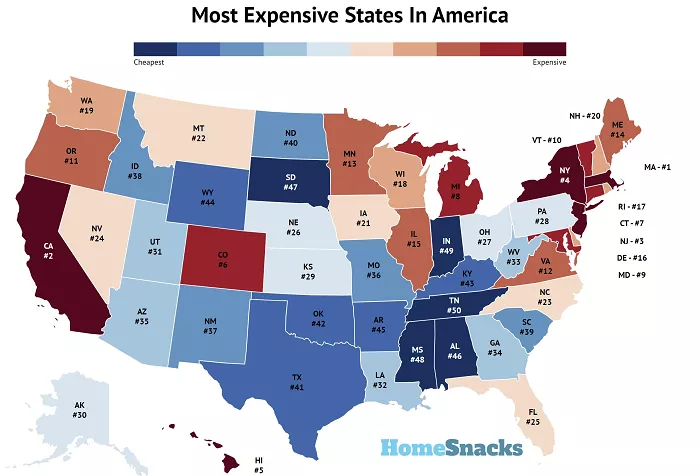When considering a move from California to Nevada, one of the primary factors to evaluate is the cost of living. Both states offer unique advantages and challenges, but understanding the financial implications can significantly influence your decision.
California and Nevada, neighboring states on the U.S. West Coast, present distinct lifestyles and economic environments. California is renowned for its diverse landscapes, robust economy, and cultural influence. In contrast, Nevada is celebrated for its expansive deserts, vibrant entertainment industry, and favorable tax policies. A comprehensive comparison of the cost of living between these states is essential for individuals contemplating relocation.
Housing Costs
California:
Housing expenses in California are notably high, particularly in urban centers such as Los Angeles, San Francisco, and San Diego. The median home price in Los Angeles, for example, is 137% higher than that in Las Vegas, Nevada.
Nevada:
In contrast, Nevada offers more affordable housing options. The median home cost in Las Vegas is significantly lower than that in Los Angeles, making it an attractive option for those seeking more economical housing without sacrificing urban amenities.
Utility Expenses
California:
Utility costs in California tend to be higher, influenced by the state’s environmental regulations and demand. Residents often experience elevated electricity rates and water bills, especially during drought periods.
Nevada:
While Nevada also faces challenges related to water usage, utility costs are generally more manageable. The state’s energy infrastructure and lower demand contribute to more affordable utility expenses.
Transportation Costs
California:
California’s extensive public transportation network in cities like San Francisco and Los Angeles offers alternatives to personal vehicles. However, gasoline taxes are among the highest in the nation, and vehicle maintenance costs can add up.
Nevada:
Public transportation options in Nevada are more limited, particularly outside major urban areas. Consequently, residents often rely on personal vehicles, incurring costs related to fuel, insurance, and maintenance.
Grocery and Consumer Goods
California:
Grocery prices in California are relatively high, influenced by the state’s agricultural regulations and cost of living. Residents spend an average of $291 per week on groceries.
Nevada:
In Nevada, grocery expenses are slightly lower, with residents spending approximately $291 per week.
Taxes
California:
California imposes a progressive income tax system with rates ranging from 1% to 13.3%. Additionally, sales and property taxes contribute to the overall tax burden, making it one of the highest in the nation.
Nevada:
Nevada stands out for its lack of a state income tax, providing significant savings for residents. However, the state compensates with higher sales and property taxes. It’s essential to assess how these taxes align with your financial situation.
Healthcare Expenses
California:
California offers a broad range of healthcare facilities and services, often at higher costs due to demand and regulatory standards.
Nevada:
Healthcare services in Nevada are generally more affordable, though options may be more limited in rural areas. It’s advisable to research healthcare facilities in potential relocation areas.
Entertainment and Leisure Activities
California:
The state’s diverse landscapes and cultural offerings provide a plethora of entertainment options, from beaches to national parks to urban attractions. However, many of these activities can be costly.
Nevada:
Nevada, particularly Las Vegas, is renowned for its entertainment scene, including casinos, shows, and nightlife. While many attractions are designed for tourists, residents can often find discounted rates.
Education Costs
California:
Home to prestigious universities and a vast public education system, California’s education expenses can be significant, especially in urban districts.
Nevada:
Education funding in Nevada varies, with some areas facing challenges in resources and facilities. It’s crucial to research school districts when considering relocation.
Conclusion
Relocating from California to Nevada can result in a reduced cost of living, primarily due to lower housing expenses, the absence of a state income tax, and more affordable utility costs. However, it’s essential to consider the trade-offs, such as differences in public services, educational quality, and entertainment options. A thorough assessment of personal priorities and financial implications is recommended when making such a significant decision.

